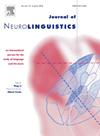Incremental processing of postverbal negation: ERP evidence from Korean
IF 1.2
3区 心理学
Q2 LINGUISTICS
引用次数: 0
Abstract
This study examines the processing of sentential negation in Korean, a head-final language, within pragmatically felicitous contexts. Using an ERP truth-value judgment task, we found evidence suggesting that when the negator follows a clause-final verb in Korean, the negation is processed incrementally after the affirmative representation has been formed. Fifty-six Korean speakers judged true affirmatives faster and more accurately than false affirmatives, while negative sentences elicited slower and less accurate responses for both true and false trials. Notably, ERP results revealed that only negative sentences elicited enhanced neural activity during the 300–500 ms time window, indicating increased processing costs compared to affirmatives. These results suggest that postverbal negation in Korean involves two-step processing: the negative marker is processed sequentially after the verb, following the initial formation of the affirmative representation of the clause, even in pragmatically licensed contexts. This underscores the significance of language-specific attributes such as the placement of a negator relative to the verb in understanding how negation is processed.
言语后否定的增量加工:来自韩语的ERP证据
本研究考察了在语用恰当语境下,韩国语否定句的加工过程。使用ERP真值判断任务,我们发现证据表明,当否定者跟随韩国语从句结尾动词时,在肯定表征形成后,否定被逐步加工。56名韩国人对真肯定句的判断比假肯定句更快、更准确,而否定句在真假两种情况下的反应都更慢、更不准确。值得注意的是,ERP结果显示,在300-500 ms的时间窗口内,只有否定句引起了神经活动的增强,这表明与肯定句相比,处理成本增加了。这些结果表明,韩语中的后置否定涉及两步加工:否定标记在动词之后依次加工,在句子肯定表征的初始形成之后,即使在语用许可的语境中也是如此。这强调了语言特定属性的重要性,比如否定词相对于动词的位置在理解否定是如何被处理的过程中。
本文章由计算机程序翻译,如有差异,请以英文原文为准。
求助全文
约1分钟内获得全文
求助全文
来源期刊

Journal of Neurolinguistics
医学-神经科学
CiteScore
3.90
自引率
5.00%
发文量
49
审稿时长
17.2 weeks
期刊介绍:
The Journal of Neurolinguistics is an international forum for the integration of the neurosciences and language sciences. JNL provides for rapid publication of novel, peer-reviewed research into the interaction between language, communication and brain processes. The focus is on rigorous studies of an empirical or theoretical nature and which make an original contribution to our knowledge about the involvement of the nervous system in communication and its breakdowns. Contributions from neurology, communication disorders, linguistics, neuropsychology and cognitive science in general are welcome. Published articles will typically address issues relating some aspect of language or speech function to its neurological substrates with clear theoretical import. Interdisciplinary work on any aspect of the biological foundations of language and its disorders resulting from brain damage is encouraged. Studies of normal subjects, with clear reference to brain functions, are appropriate. Group-studies on well defined samples and case studies with well documented lesion or nervous system dysfunction are acceptable. The journal is open to empirical reports and review articles. Special issues on aspects of the relation between language and the structure and function of the nervous system are also welcome.
 求助内容:
求助内容: 应助结果提醒方式:
应助结果提醒方式:


